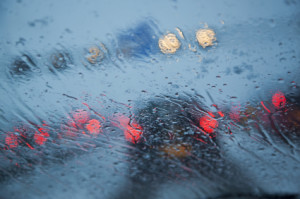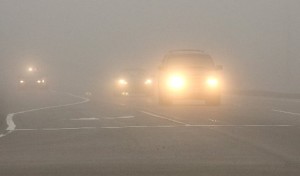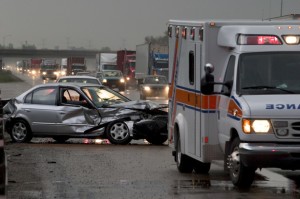- May 15, 2014
- Posted by: BlueSkies
- Category: Forensic Meteorology
How many of us check the weather before hopping in our cars for our morning or evening commutes, before a road trip, or even before a quick trip to the grocery store? I’d hazard to say that many, if not most, of us do.
But why? Why do we care what the weather is doing outside when we’re safely ensconced in our climate-controlled vehicular bubble? Is it just so that we can decide whether to grab our jacket or umbrella? Or is there perhaps an even more important reason to check the weather before jumping behind the wheel – anticipation of risk?
Weather is a critically important factor in roadway conditions. Rain or snow-slicked roads reduce tire traction, dramatically increasing stopping distances. Fog and precipitation of any kind reduce visibility, limiting how far ahead we can see, and therefore how quickly we can react to danger. Wind can destabilize high-profile vehicles, and the low sun angles just after sunrise and just before sunset can lead to blinding sun glare.
According to the National Highway Traffic Safety Administration, atmospheric conditions are a critical factor in almost 25% of all motor vehicle accidents in the US: adverse weather has historically been a critical factor in 8.4% of collisions, with another 16.4% critically affected by sun glare. With an average of 10.5 million motor vehicle accidents annually in the US, atmospheric conditions are therefore a vital factor in over 2.6 million crashes each and every year.
One such weather-impacted accident occurred in January of 1998, when former Boston Red Sox player, Mo Vaughn, flipped his SUV while driving home from Rhode Island. Vaughn was originally arrested on suspicion of operating his vehicle under the influence, but a forensic meteorological analysis of the weather conditions on the evening of the crash revealed that dense ground fog blanketed the area in which the accident occurred, leading to extremely low visibility. Due in large part to forensic meteorological information about the hazardous weather conditions present at the time of the accident, Mo Vaughn was acquitted of the OUI charge.
With summer comes an increase in the number of afternoon thunderstorms and their accompanying hazards, especially here in Florida: blinding rain, slick roads, strong winds, even hail and tornadoes. These weather conditions can and do contribute to motor vehicle accidents and deaths.
So, check the weather before you drive, and not just to inform wardrobe decisions. Anticipate any weather-related risks and take appropriate precautions (like leaving a bit earlier than planned, driving more slowly, and leaving more distance between you and the car in front of you).
In the unfortunate event that you or a client is involved in a weather-impacted accident that results in criminal charges or an insurance dispute, give Blue Skies Meteorological Services a call or send us an email. We will gladly provide a free initial consultation to determine how a forensic meteorological analysis could support your case by revealing the exact weather conditions in place at the time and location of the accident.



